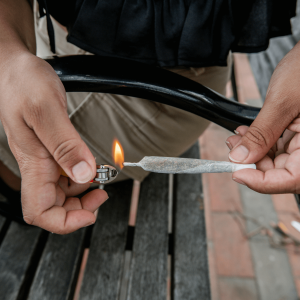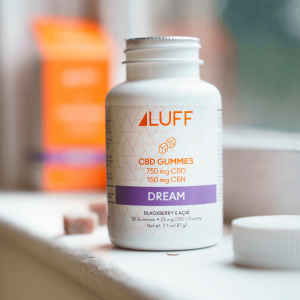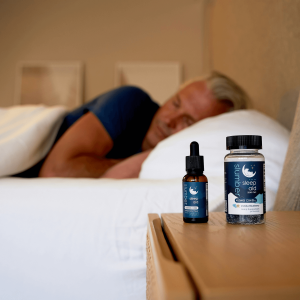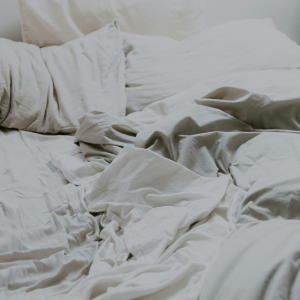Cannabidiol, or more commonly referred to as CBD, has been making waves in the wellness community for its potential health benefits.
Extracted from the hemp plant, CBD is a natural compound that doesn’t produce the “high” associated with its cousin compound, THC. It’s being explored for a variety of uses, one of the most popular being its potential to help with sleep.
Good sleep is crucial for overall health and well-being; it affects everything from mood and energy levels to immune function and cognitive performance. Many people are turning to CBD as a natural remedy to improve their sleep quality. In this blog, we’ll discuss what makes CBD effective for sleep, review some of the best CBD for sleep on the market, and provide tips on how to choose the right one for your needs.
Let’s get started!
What is CBD?
CBD, short for cannabidiol, is a naturally occurring compound found in the hemp plant. Unlike THC (tetrahydrocannabinol), which is another well-known compound from the cannabis plant, CBD does not produce any psychoactive effects—meaning it won’t get you “high.” Instead, CBD is celebrated for its potential therapeutic benefits, including reducing anxiety, alleviating pain, and improving sleep.
In terms of legality, CBD’s status varies widely across different regions. In the United States, for instance, CBD derived from hemp (containing less than 0.3% THC) was legalized federally under the 2018 Farm Bill. However, state laws can further restrict or allow its use, so it’s essential to be informed about local regulations before purchasing or using CBD products.

Understanding Sleep Disorders
Sleep disorders are conditions that disturb your regular sleep patterns, making it difficult to get a restful night’s sleep. These disorders can range from common issues like insomnia to more severe conditions such as sleep apnea. Here are some of the most common types of sleep disorders:
- Insomnia: Trouble falling or staying asleep.
- Sleep Apnea: Breathing interruptions during sleep.
- Restless Leg Syndrome (RLS): Uncomfortable sensations in the legs.
- Narcolepsy: Excessive daytime sleepiness and sudden sleep attacks.
Understanding these disorders is the first step in finding effective treatments, and many people are exploring options like CBD to help manage their symptoms.
Statistics on Sleep Disorders
Sleep disorders are more common than you might think, affecting millions of people worldwide. According to the American Sleep Association, about 50-70 million adults in the United States have a sleep disorder. Insomnia is the most prevalent, with around 30% of adults experiencing short-term symptoms and 10% suffering from chronic insomnia.
These conditions can have a significant impact on health and daily life, leading to issues such as decreased cognitive functions, mood swings, and a weakened immune system. Lack of quality sleep can result in an increased risk of chronic illnesses such as hypertension, heart disease, and diabetes.
How CBD Works in the Body
Ever wondered how CBD actually works? It’s all about our body’s endocannabinoid system (ECS). The ECS is a complex cell-signaling system identified in the early 1990s by researchers exploring THC, another well-known cannabinoid. While the ECS plays a crucial role in regulating a range of functions and processes—including sleep, mood, appetite, memory, and reproduction—it also helps maintain homeostasis, or balance, in the body.
Interaction of CBD with CB1 and CB2 Receptors
In the ECS, there are two primary types of receptors: CB1 and CB2. CB1 receptors are mainly found in the brain and central nervous system, while CB2 receptors are more common in the immune system and peripheral organs. Unlike THC, which directly binds to CB1 receptors, CBD interacts with these receptors in a more indirect manner. It doesn’t bind directly but can modulate the receptor’s effects, balancing the ECS and potentially leading to a beneficial outcome for sleep, pain management, and relaxation.
Role of CBD in Promoting Relaxation
Now, how exactly does CBD promote relaxation? By interacting with the ECS, CBD helps maintain equilibrium in various bodily functions. It can influence the release of neurotransmitters like serotonin and dopamine, which are vital for improving mood and creating a sense of well-being. Moreover, CBD has been noted to reduce anxiety and stress levels, making it easier to relax and prepare for a good night’s sleep.
Scientific Evidence on CBD and Sleep
There’s been quite a bit of buzz around CBD and its potential to enhance sleep quality. But what does the science actually say?
Research into CBD’s effects on sleep is still in its early stages, but the findings so far are promising. Several studies have highlighted CBD’s potential in reducing insomnia and improving sleep quality. A 2019 study published in The Permanente Journal, for instance, found that 66.7% of participants reported better sleep after using CBD.
Summary of Clinical Trials
Clinical trials offer more concrete evidence of CBD’s effectiveness. One such trial conducted in 2019 involved 72 participants with anxiety and poor sleep. After a month of CBD use, nearly 79.2% of participants reported decreased anxiety, and 66.7% noted improved sleep quality. Although more extensive trials are needed to solidify these results, initial data looks hopeful.

Types of CBD Products for Sleep
When it comes to choosing CBD for sleep, there’s no one-size-fits-all solution. Everyone has different preferences and needs, so it’s great that there are various types of CBD products available.
Let’s take a closer look at some of the most popular options:
CBD Oil
CBD oil is perhaps the most versatile CBD product out there. It typically comes in a glass bottle with a dropper, allowing you to measure the exact amount of CBD you want to take. This oil can be consumed directly by placing it under your tongue, or it can be mixed into foods and drinks.
Many people prefer CBD oil for its fast-acting effects, making it a popular choice for those who need immediate relief from sleep issues. Plus, it comes in various strengths and flavors, so you can tailor it to your liking.
CBD Gummies
For those who want a tastier and more enjoyable way to take their CBD, gummies are an excellent option. These chewy treats are infused with CBD and usually come in a variety of flavors and shapes.
Not only do CBD gummies taste great, but they’re also discreet and easy to dose since each gummy typically contains a pre-measured amount of CBD. This makes them a convenient choice for people who are new to CBD or who prefer a hassle-free approach to supplementation.
CBD Capsules
CBD capsules offer a straightforward and familiar way to incorporate CBD into your daily routine. Each capsule contains a specific amount of CBD, making it easy to know exactly how much you’re taking.
This consistency is beneficial for those who need regular dosing, and the capsules are easy to swallow with a glass of water. They’re also an excellent option for people who prefer not to taste the earthy flavor of CBD oil or gummies.
CBD Topicals
If you have localized pain or prefer not to ingest CBD, topicals might be the way to go. CBD topicals include creams, balms, and lotions that can be applied directly to the skin. These products are excellent for targeting specific areas, such as sore muscles or joints.
While they might not directly help with sleep in the same way that ingesting CBD does, they can provide relief from discomfort that might otherwise keep you up at night. Some topicals are even formulated with additional ingredients like lavender or chamomile to enhance relaxation.
Full-Spectrum vs. Broad-Spectrum vs. Isolate CBD
When diving into the world of CBD, you’ll come across terms like full-spectrum CBD, broad-spectrum, and isolate. Understanding the differences between these types can help you make a more informed choice about which product might suit your needs best.
Full-Spectrum CBD
Full-spectrum CBD oil contains all the naturally occurring compounds found in the cannabis plant, including a wide range of cannabinoids, terpenes, and even trace amounts of THC (usually less than 0.3%). This combination is thought to create an “entourage effect,” where the various components work together to enhance the overall benefits.
Pros:
- Offers the entourage effect, which may amplify the therapeutic effects of CBD.
- More natural and less processed compared to other types.
Cons:
- Contains trace amounts of THC, which could be an issue for those wanting to avoid any THC.
- Might have a strong, earthy flavor that some people find off-putting.
Broad-Spectrum CBD
Broad-spectrum CBD also contains multiple cannabinoids and terpenes but is processed to remove all THC. This option is excellent for those who want to experience the entourage effect without the presence of THC.
Pros:
- Offers some level of the entourage effect without any THC.
- Generally more palatable compared to full-spectrum.
Cons:
- Still might have a mild, earthy flavor.
- Slightly more processed than full-spectrum CBD.
Isolate CBD
CBD isolate is the purest form of CBD, containing no other cannabinoids or terpenes. This pure CBD extract is often used by people who want to experience the benefits of CBD without consuming any other cannabis compounds.
Pros:
- Contains 99% pure CBD, with no THC.
- Has no flavor, making it easy to incorporate into various foods and drinks.
Cons:
- Lacks the entourage effect, which may reduce its overall therapeutic impact.
- More processed than both full-spectrum and broad-spectrum options.
Which Type Might Be Best for Sleep?
When choosing the best type of CBD for sleep, it largely depends on your individual needs and preferences. Many people find full-spectrum CBD to be the most effective for sleep due to the entourage effect, which includes cannabinoids like THC and THCa working together to enhance relaxation and improve sleep quality. However, if you want to avoid THC and THCa altogether, broad-spectrum CBD can still offer similar benefits without these compounds. For those who prefer a pure CBD option with no other cannabinoids or terpenes, CBD isolate provides a straightforward and easy-to-dose choice.
So basically, while full-spectrum CBD is often considered the best option for promoting sleep, broad-spectrum CBD offers a good middle ground for those wary of THC. CBD isolate, on the other hand, is perfect for individuals focused solely on the benefits of pure CBD.

Key Ingredients in CBD Sleep Products
When you’re on the hunt for the perfect CBD sleep product, like CBD gummies, it’s crucial to consider the other natural sleep aids that might be included to boost its effectiveness. Some of the common additives that help with sleep include melatonin, chamomile, and valerian root. Each of these has its own set of benefits that can complement the soothing properties of CBD.
- Melatonin is a hormone naturally produced by your body to regulate sleep-wake cycles. Adding melatonin to CBD products, such as CBD gummies, can enhance their sleep-inducing effects, making it easier for you to fall asleep and stay asleep.
- Chamomile, often consumed as a tea, is another popular additive. Known for its calming properties, chamomile can help reduce anxiety and promote relaxation, making it a great companion for CBD in sleep aids.
- Valerian root is an herbal remedy long used to treat insomnia and restlessness. It’s believed to increase levels of a neurotransmitter called GABA, which induces a calming effect on the brain.
Natural vs. Synthetic Ingredients
When it comes to ingredients, you’ll find both natural and synthetic options in the world of CBD gummies and other CBD sleep products. Natural ingredients like melatonin, chamomile, and valerian root are derived from plants or naturally occurring substances in the body. These are generally preferred for their minimal side effects and holistic benefits.
On the other hand, some CBD gummies for sleep might contain synthetic versions of these ingredients. While synthetic ingredients are easier to standardize for consistent dosing, they can sometimes cause unwanted side effects or lack the holistic benefits of their natural counterparts.
Importance of Ingredient Quality and Purity
The quality and purity of the ingredients in your CBD sleep products, such as CBD gummies, are essential for both efficacy and safety. High-quality ingredients that are free from contaminants like pesticides, heavy metals, and synthetic additives can significantly enhance your overall experience and results.
It’s always a good idea to look for products that have been third-party tested for quality and purity. This ensures that what you’re putting into your body is safe and effective, helping you get the best possible outcome from your CBD sleep aid.
Dosage Guidelines for CBD and Sleep
Several factors can influence the right dosage of CBD for a restful sleep. These include your weight, metabolism, and the severity of your sleep issues. Generally, the heavier you are, the higher the dose you might need to feel the effects.
Metabolism also plays a big role—some people process CBD gummies more quickly, which can impact how long the effects last.
Finally, if you’re dealing with severe insomnia or chronic sleep problems, you might require a higher dosage compared to someone facing occasional sleeplessness.
Starting with a Low Dose
It’s usually best to start low and go slow. Begin with a small dose, such as 5-10 mg of CBD products, to see how your body reacts. If you don’t notice any improvements after a few days, you can gradually increase the dosage. The goal is to find the minimum effective dose—the smallest amount of CBD that helps you fall and stay asleep without causing any unwanted side effects.
How to Adjust Dosage for Effectiveness
Adjusting your dosage can be a bit of trial and error. If you start with a low dose and don’t see improvements, you can increase your intake by small increments, such as 5 mg at a time. Give each new dose a few days to a week to take effect before making further adjustments.
Keeping a sleep journal can be really helpful in tracking your progress and finding the most effective dosage for you.
Potential Side Effects of CBD
While CBD is often touted for its potential health benefits, it’s important to be aware that it can also come with some side effects. Understanding these potential drawbacks will help you make a more informed decision about incorporating CBD into your routine. Let’s take a closer look at some of the most common side effects associated with CBD use.
Common Side Effects
While CBD is generally well-tolerated, some people do experience side effects. Common ones include dry mouth, diarrhea, reduced appetite, and drowsiness. These side effects are usually mild and often resolve on their own as your body gets used to the supplement.
Rare, Severe Side Effects
In rarer cases, some may experience more severe side effects like changes in alertness, mood changes, or an upset stomach. Although uncommon, these side effects are generally more likely when taking very high doses of CBD.
How to Mitigate Side Effects
To minimize side effects, always start with a low dose and gradually increase it as needed. Make sure to stay hydrated and try taking CBD with food to help reduce stomach-related issues. If you experience severe or persistent side effects, it’s a good idea to consult with a healthcare professional to make sure that CBD is a safe option for you.
Personalizing Your CBD Sleep Routine
Creating a consistent sleep schedule is a key step in personalizing your CBD sleep routine. Aim to go to bed and wake up at the same times every day, even on weekends. This helps regulate your internal clock and improve the quality of your sleep.
Combining CBD with other sleep aids, such as herbal teas or essential oils like lavender, can enhance its effectiveness. Incorporate tips for improving sleep hygiene into your daily routine as well—such as keeping your bedroom cool and dark, limiting screen time before bed, and engaging in relaxing activities like reading or taking a warm bath.
By customizing your approach, you can make CBD a more effective part of your path to better sleep.

Exercise and CBD for Sleep Improvement
Regular exercise is a fantastic way to improve sleep quality. Engaging in physical activity helps regulate your circadian rhythm, reduce stress, and tire your body out in a healthy way, making it easier to fall asleep and stay asleep.
Whether it’s a brisk walk, a fun yoga session, or weightlifting at the gym, incorporating some form of exercise into your daily routine can significantly enhance your sleep patterns.
How CBD Can Enhance Post-Exercise Recovery
After a good workout, your muscles need time to recover and repair. This is where CBD can be incredibly beneficial.
Known for its anti-inflammatory properties, CBD can help reduce muscle soreness and speed up recovery time, making it easier for you to stick to your exercise routine. Additionally, its calming effects can help manage post-exercise stress, allowing your body to relax and prepare for a restful night of sleep.
Combining Exercise and CBD for Optimal Sleep
When you combine regular exercise with CBD, you’re setting yourself up for the best possible sleep experience. Exercise helps regulate your sleep cycle, while CBD aids in muscle recovery and reduces stress. Together, they create a powerful synergy that can dramatically improve your sleep quality.
Try taking CBD after your workout and before bed to reap both the physical and emotional benefits, and watch as your nights grow more restful and rejuvenating.
Seasonal Considerations for CBD Use
When it comes to sleep, seasons can have a surprisingly big impact on our patterns.
During winter, the longer nights might mess with your body’s natural rhythm, making you feel sleepier earlier.
On the flip side, summer’s extended daylight can delay your sleep schedule. Adjusting your CBD use according to these seasonal changes can help keep your sleep cycle on track. For instance, you might find that you need a slightly higher dose in the winter to combat the early evening drowsiness.
In hot climates, staying hydrated is crucial as CBD can cause dry mouth; pairing your dose with plenty of water and taking it with a balanced meal can help. In colder weather, taking a warm bath with CBD-infused products can enhance relaxation before bedtime.
So, understanding how different seasons and climates affect you can play a key role in optimizing your sleep with CBD.
CBD and Sleep: Beyond the Basics
When it comes to maximizing the effects of CBD on sleep, it’s all about fine-tuning and combining it with other wellness practices.
Consider integrating mindfulness exercises like meditation or deep-breathing techniques into your nightly routine to complement the calming properties of CBD. Yoga and stretching can also work wonders, promoting relaxation and setting the stage for a restful night.
Long-term success with CBD requires consistent monitoring and adjusting your dosage according to your body’s evolving needs. Keeping a detailed sleep journal can offer insights into how CBD interacts with various aspects of your lifestyle, helping you pinpoint the ideal dosage and timing for optimal sleep.
This holistic approach ensures that CBD becomes a seamless and effective part of your sleep wellness journey.
Conclusion
Using CBD as part of your sleep routine can provide a natural way to enhance sleep quality and overall well-being. In this blog, we’ve explored how maintaining a regular sleep schedule, combining CBD with other sleep aids, and incorporating exercise can create a powerful synergy for better sleep. We’ve also covered how to manage common and rare side effects and how to adjust your CBD use according to seasonal changes.
It’s important to remember that while CBD offers many benefits, it’s always wise to consult with a healthcare provider before starting any new supplement. They can help determine the right dosage for you and ensure that it’s a safe option based on your personal health circumstances.
By carefully personalizing your approach, you can make CBD an effective ally on your journey to better sleep. With the added convenience of cannabis delivery services, accessing high-quality CBD products is easier than ever.

Frequently Asked Questions
1. What kind of CBD is best for sleeping?
When it comes to choosing the right CBD for sleep, many people find that full-spectrum CBD products work best. Full-spectrum CBD contains a variety of cannabinoids, terpenes, and other compounds found in the cannabis plant, which can work together to enhance the overall effects—this is known as the “entourage effect.” However, if you prefer to avoid THC, broad-spectrum CBD or CBD isolate might be better options. These products can still be effective for sleep without any THC content.
2. What level of CBD is good for sleep?
The ideal level of CBD for sleep can vary from person to person. Generally, a dosage between 10 to 50 mg taken about an hour before bedtime is a good starting point. It’s always wise to start with a lower dose and gradually increase it until you find the amount that works best for you. Keep in mind that factors like body weight, metabolism, and the severity of your sleep issues can influence how much CBD you might need.
3. Is it okay to take CBD every night?
Yes, it is generally considered safe to take CBD every night. Many people use CBD as a nightly supplement to help improve their sleep quality and overall well-being. However, it’s important to monitor how your body responds and adjust your dosage if needed. If you experience any side effects or if you have any concerns, it’s always a good idea to consult with a healthcare professional.
4. Do doctors recommend CBD oil for sleep?
Some doctors do recommend CBD oil for sleep, especially when traditional sleep aids have not been effective or if you’re looking for a more natural alternative. However, medical opinions can vary, and CBD is not yet universally accepted as a standard treatment for sleep disorders. Always consult with a healthcare provider to get personalized advice and to ensure that CBD is a suitable option for you, particularly if you have underlying health conditions or are taking other medications.

 Rewards
Rewards




